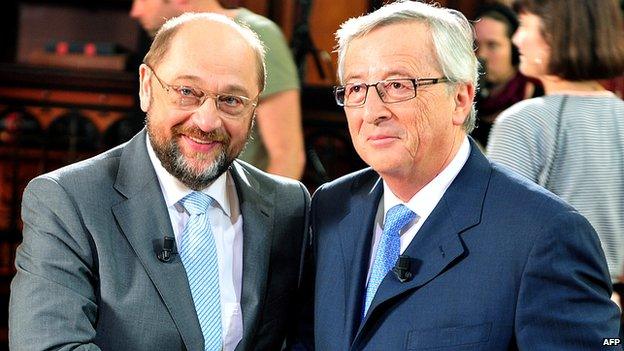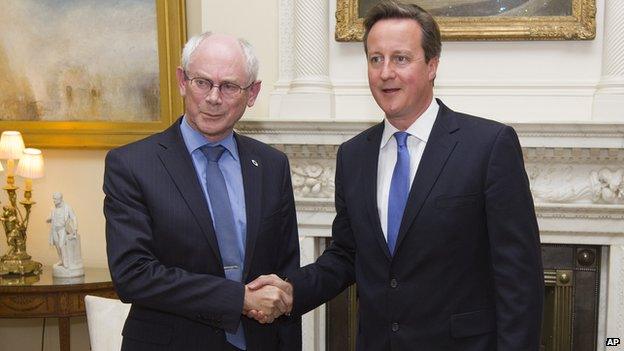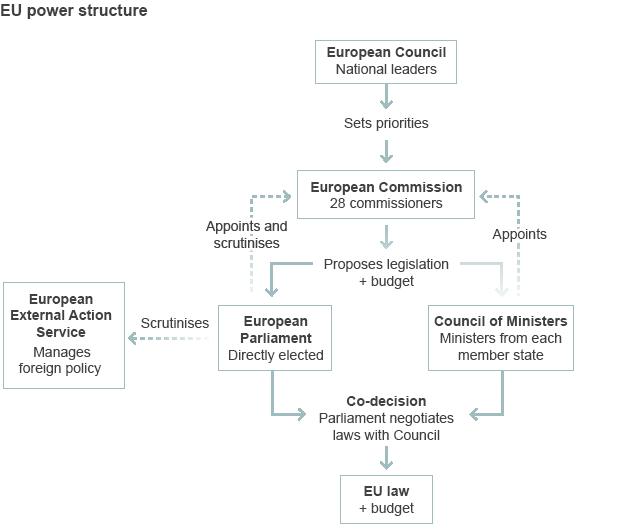Arguments for and against Jean-Claude Juncker
- Published

Mr Juncker (right) now has support from the European Socialists' leader Martin Schulz
The EU is preoccupied with the "Juncker question": can the UK government stop Jean-Claude Juncker becoming EU Commission President?
Time is running out for Prime Minister David Cameron, as most EU leaders look set to back Mr Juncker at the EU summit this Friday. And a majority in the European Parliament will back him too, commentators say.
So what are the chief arguments for and against choosing the 59-year-old former Luxembourg Prime Minister? Generally his supporters are in the pro-EU integration camp, while his opponents tend to be Eurosceptic, urging far-reaching reform of the EU.
FOR:
His centre-right European People's Party (EPP) won the European elections in May
He is a veteran of EU politics and played a key role in the bailouts for Greece, Portugal and other debt-laden countries
Appointing him would give the European Parliament more credibility among voters, since he was the EPP's lead candidate, rather than EU governments picking a name behind closed doors
Many argue that the euro will only work long term if there is a political, as well as monetary, union - and he stands for that
He believes the EU is much more than the single market - it stands for solidarity between nations and help for Europe's poorest regions
AGAINST:
He is too federalist and will not favour transferring powers from Brussels back to member states - a key policy issue for David Cameron
Appointing him could jeopardise efforts to keep the UK in the EU, making the UK more isolated in Europe
He represents "old school" Brussels thinking, at a time when millions of voters have shown they are fed up with the EU
His experience is in forging EU compromises through slow negotiations, not the agile policy-making that many reformists demand
He has not pushed for more democratic accountability in the EU.

Mr Cameron (right) argued against Mr Juncker in talks with European Council head Herman Van Rompuy
What powers does the Commission president have? Well, it is the top EU job, because the Commission is the only body that can draft EU laws.
Those laws are often extensively amended by the Council - that is, European ministers - and by MEPs, who negotiate the fine details.
The Commission also imposes penalties on governments and firms that break or ignore EU laws. So in some ways the Commission president is also the EU's "top cop", ensuring compliance with EU treaties. Fair competition and human rights come under the Commission's remit.
But the Commission was set up to be more a civil service than a government. Its officials are supposed to be above national politics, instead acting in the interests of the EU as a whole. MEPs monitor the Commission's actions and are often quick to flag up perceived bias.
And the Commission negotiates far-reaching EU trade deals with other countries. There are hopes that a planned free trade zone with the US could give a much-needed boost to Europe's struggling economies.
The battle for this top job has become a battle of competing visions for the EU. The worry is that the EU may get bogged down in institutional bickering - again - when it really needs to be tackling economic stagnation and record unemployment.

Matthew Price explains why the appointment of a new European Commission president is causing divisions among members